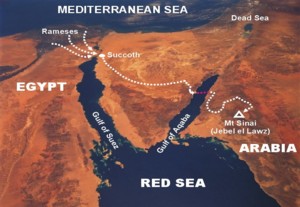This is a series not on my current pilgrimage, but on the Theology of Pilgrimage. A priest-friend from Denver once said to me: “Pilgrimage isn’t just another analogy for the Christian life. Pilgrimage is the reality of the Christian life.” That may not sound too profound at first, but the more I meditated on the Old and New Testament, the more I realized that every book of the Bible fulfilled these words. It is no wonder that he had walked the Camino a few times.
I’m in Spain now, but when I wrote this post, I was flying from India to Spain. Flying over the Red Sea, I look at the computer map of our location and I notice we’re directly south of the spot where Moses miraculously crossed with half a million Hebrews.
That was 3300 years ago. As I look through the plane window, I see the most majestic, mysteriously-straight clouds lighly separating me from the greatest Old Testament miracle. I can even see the shores of the sea that God miraculously parted at the lifting of the hands of Moses…and then closed upon the armies of Egypt.
So, I have to wonder: Why did God have the Israelites wander in the desert for so long before getting them to the promised land? Of course, Scripture is clear it was a punishment for rebellion. But there was also something to be learned within the pilgrimage: It was to divest Israel from treating Adonai like another addictive-idol.
The book Grace and Addiction, although written by a non-Catholic, has an important commentary about loving God in freedom:
Full and freely chosen love for God requires searching and groping. What would happen to our freedom if God, our perfect lover, were to appear before us with such objective clarity that all our doubts disappeared? We would experience a kind of love, to be sure, but it would be love like a reflex. Almost without thought, we would fix all our desires upon this Divine Object, try to grasp and possess it, addict ourselves to it. I think God refuses to be an object for attachment because God desires full love, not addiction. Love born of true freedom, love free from attachment, requires that we search for a deepening awareness of God, just as God freely reaches out to us.—Grace and Addiction by Gerald May, p. 94
This is the theology of pilgrimage: What it takes people of every vocation to die in sanctifying grace so as to experience the beatific vision. It’s not all pain, but we’re going to see how detachment is God’s surgery in our life to remove idols of comfort so that He can have us behold Him forever.
In the next sections released on Saturdays (if I can find hostels with computers so as to write posts as I trek across Spain) we’re going to explore this detachment, this journey and the final destination.

